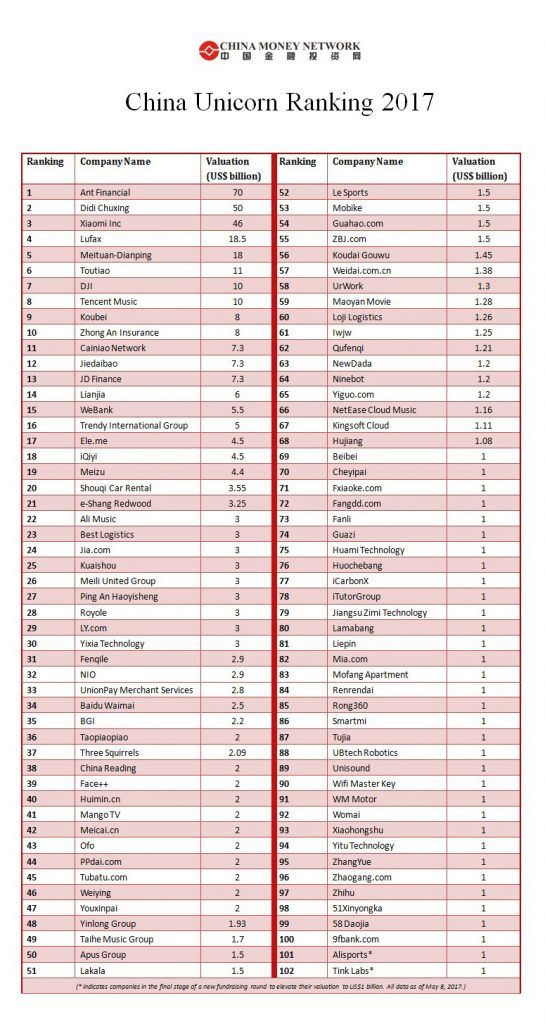We live in the age of unicorns. Since the term was coined in 2013 by venture capitalist Aileen Lee to describe start-ups valued at US$1 billion or more, unicorns have multiplied with incredible speed. The unicorn, symbolizing the statistical rarity of such successful ventures, has become almost commonplace. With 193 unicorns globally worth US$664 billion in total*, unicorns also reflect the rise of private capital and investor euphoria over the promise of technology, especially in China.
China Money Network today launches the China Unicorn Ranking 2017, the most complete list of all private start-ups in China currently valued at US$1 billion or more. We count 102 Chinese unicorns in total, with a combined net worth of US$435 billion, just shy of Belgium's gross domestic product (GDP). If Chinese unicorns were an independent nation, they would form the world's 26th largest economy.
As the second largest economy of the world, China's unicorn herd account for 53% of the global total, and 66% in terms of valuation**, highlighting the sheer size of the Chinese start-up universe and the extent of investor optimism.
This years rankings' top ten spots are dominated by eight decacorns, a term used for private venture-funded companies worth over US$10 billion, including Alibaba's Ant Financial, smartphone maker Xiaomi Inc., ride sharing firm Didi Chuxing, Internet finance firm Lufax, peer review and group buying platform Meituan-Dianping, news app Toutiao, drone-maker DJI and Tencent Music.
The prevalence of Chinese tech giant trio, Baidu, Alibaba and Tencent, commonly referred to as BAT, is evident throughout the list. Thirteen unicorns worth US$124.51 billion are directly affiliated with or controlled by the BAT, taking 29% of the total in terms of valuation.
Tencent, Alibaba and Baidu each have 22, 13 and 10 unicorns under their belt, respectively. If included in our Top 10 VCs Backing China's Unicorn Boom ranking, which we also debut today, they would stand among the most skilled venture investors in the market.
In terms of industry, financial technology, mobile Internet, on-demand and O2O (online-to-offline), and e-commerce are the sectors giving birth to the most unicorns, highlighting the ascendancy of mobile Internet and how smartphones are changing people's lives in profound ways.
"The key driver is the hundreds of millions of people in China and billions worldwide who have started to use smartphones to access the Internet," said JP Gan, managing partner of Qiming Venture Partners, regarding today's release of the ranking. "People are also getting used to many of the new apps enabled by ILOVs, which means image, location, voice and sensors."
Other standout sectors include logistics, real-estate services and healthcare-related companies, all of which are using the Internet to streamline and enhance traditional industries. Artificial intelligence, which became the buzzword last year, give birth to five pure-play AI unicorns.
Sectors that did not feature prominently on the list are also telling. Despite China's traditional emphasis on education and e-learning platforms, there are only two education unicorns. The travel sector, dominated by Ctrip, and the healthcare sector, still highly fragmented, have only two unicorns each.
Meanwhile, the Chinese unicorn phenomenon is showing signs of cracking under the weight of astronomically-high valuations. Over a dozen companies on the list have seen their net worth shrink because their business fundamentals couldn't catch up with the pace of their skyrocketing valuations.
E-commerce snack retailer, Three Squirrels, is only half the unicorn it used to be. Back in 2015, at the height of the mobile Internet frenzy, the company was reportedly valued at RMB30.7 billion (US$4.45 billion). But a recent filing with Chinese securities regulators ahead of a planned IPO in Shenzhen shows the company's valuation has fallen to RMB14.4 billion (US$2.09 billion).
Tiantian Express, a Hangzhou-based courier service provider, was sold to a logistics subsidiary of Chinese retail giant Suning Commerce Group in January for RMB4.25 billion (US$612 million), a 35% discount from its RMB6.5 billion valuation a year ago when it raised a RMB600 million round.
Other companies suffering valuation downgrades include Zhongan Insurance, e-commerce platform Koudai Gouwu, YMatou.com, tourism platform LY.com, designated driver service eDaijia, and Mango TV.
So for unicorns boasting the richest valuation, there is intense concern over whether their price-tags are both justified and sustainable. Number two on the list, ride sharing giant Didi Chuxing, recently closed a new funding round at a valuation of US$50 billion, giving the 5-year-old company a value just shy of Baidu.com's US$62 billion market capitalization.
In the world of venture capital, every unicorn needs an exit. Will investors accept Didi Chuxing's price tag when it seeks to IPO? That will be the greatest test facing many of these less-than-rare mythical creatures now captivating the business world.
(*Global numbers based on CB Insights data. **Ratios are artificially high because CB Insights includes only a small portion of the Chinese unicorns listed in China Money Network's ranking.)

